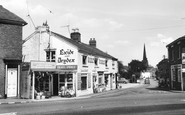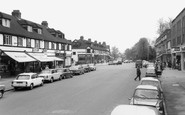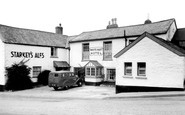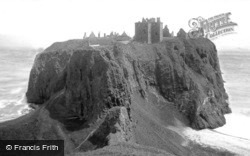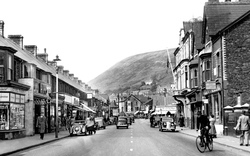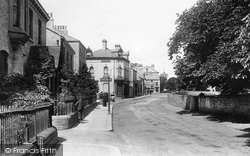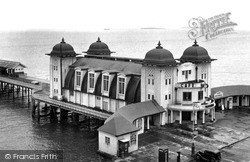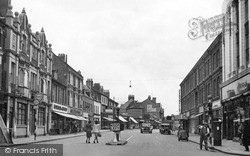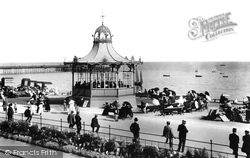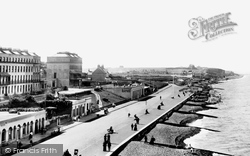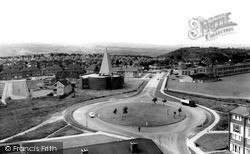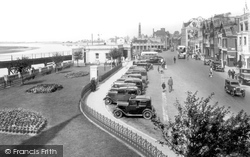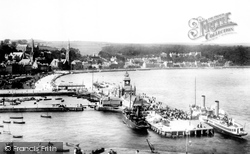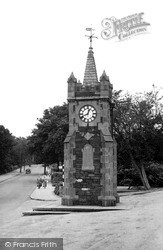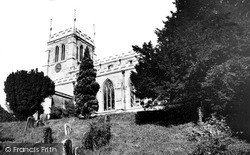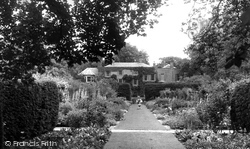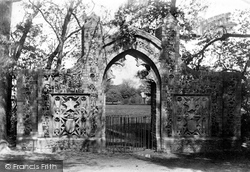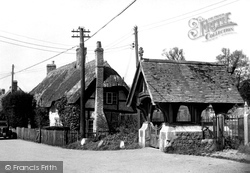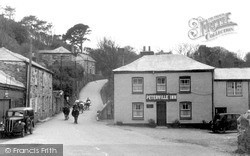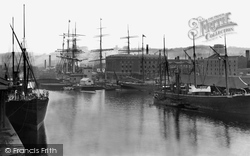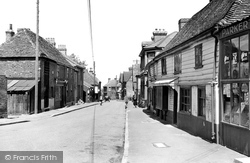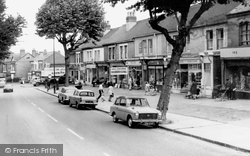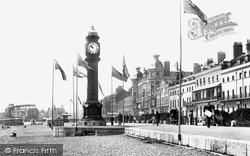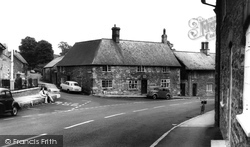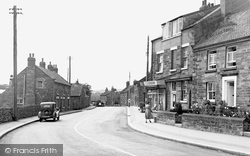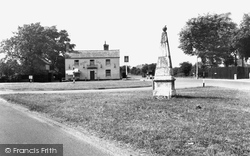Places
18 places found.
Those places high-lighted have photos. All locations may have maps, books and memories.
- Hythe, Kent
- Hythe, Hampshire
- Small Hythe, Kent
- Bablock Hythe, Oxfordshire
- Methwold Hythe, Norfolk
- Hythe, Somerset
- Hythe, Surrey
- Hythe End, Berkshire
- The Hythe, Essex
- Egham Hythe, Surrey
- West Hythe, Kent
- New Hythe, Kent
- Broad Street, Kent (near Hythe)
- Horn Street, Kent (near Hythe)
- Newbarn, Kent (near Hythe)
- Newington, Kent (near Hythe)
- Broad Street, Kent (near Hythe)
- Stone Hill, Kent (near Hythe)
Photos
360 photos found. Showing results 2,901 to 360.
Maps
101 maps found.
Books
10 books found. Showing results 3,481 to 10.
Memories
4,406 memories found. Showing results 1,451 to 1,460.
Caroline Street
My grandma was a Bell before she married Harry Davison and eventually went to live in South Market Street. She, her parents and siblings had lived at 32 Caroline Street, until they all married. Lizzie Maddison (my great-aunt ...Read more
A memory of Hetton-Le-Hole in 1950 by
Bert Price''s Shop
Bert Price's Shop was at the top of our street - Church Street. Bert Prices' shop sold anything and everything. From household buckets and dusters to DIY tools, firewood, fire lighters and paraffin for the heater in our ...Read more
A memory of Davenham in 1970 by
East Barsham Manor
The manor house was occupied by the army during the Second World War and not released until about 1946. My friends and I often cycled from Walsingham and we found the manor deserted. The entrance hall is well remembered ...Read more
A memory of East Barsham by
Hairdressers Banstead High Street 1969 1973
I worked as a Saturday girl at the hairdressers opposite the church in Banstead High Street when I was 15 in 1969. It was called Nicolette then and I worked for Margaret and her mother Mrs Anscombe. ...Read more
A memory of Banstead in 1969 by
The Brickfields Those Tall Terraced Red Houses Still There
The Brickfields, a place to catch sticklebacks,newts, tadpoles and slow worms. A friend of mine used to live in one of the terraced houses,I believe they must have once been workers' ...Read more
A memory of Wickford in 1870 by
Memories Of A Descendant Of A Bratton Fleming Family
Although I live in Canada, I have a sentimental attachment to Bratton Fleming, where my grandmother, born Melia Ann Parkin, was born long ago. This attachment was fostered by my seeing ...Read more
A memory of Bratton Fleming by
Trevor Living There Practically All My Life
Further to Gary's memory I was the Julie that he lived next door to but my surname was Evans. For practically all of my life I have lived in Trevor and still see many of the people that I grew up with. ...Read more
A memory of Trevor in 2009 by
Growing Up
I grew up in Monifieth and for the first 17 years of my life this is where I called home. I remember attending Invertay Annexe for 2 years. As it turned out both my sister and I were taught by the same teachers that had taught my ...Read more
A memory of Monifieth in 1968 by
The Sales
It was about 1956. John Sample had started to change with the times and bought himself a pick up truck, him, 'Auld Jimmy' and me went to the horse sales at Gateshead just over the bridge, and I cannot for the life of me remember if it ...Read more
A memory of Newburn in 1956 by
Pea Shooter And Buses
It was about 1953 when we discovered pluffers and ca caws. The pluffer was a device we used for a pea-shooter. This was a straight stem from a weed and it was about an inch or so in diameter, hollow through the centre and ...Read more
A memory of Newburn in 1953 by
Captions
4,899 captions found. Showing results 3,481 to 3,504.
It was here, in July 1650, that Charles II was entertained by the Earl Marischal. It was the only fortress in Scotland that flew the Stuart royal flag after Charles's defeat at Worcester in 1651.
The opening of the steelworks was followed by the building of a chemical plant at Baglan Bay by British Petroleum.
In 1744 a man by the name of John Shires discovered a saline spring, and thanks to the 18th-century fashion for taking the waters Boston Spa was born.
In 1744 a man by the name of John Shires discovered a saline spring, and thanks to the 18th-century fashion for taking the waters Boston Spa was born.
That scenario was dismissed, but costs to underpin the pier were to total £28,000, and further revenue was lost by the absence of steamer custom during the period of repair.
The 'new look' in fashions is demonstrated by the young woman crossing the street with her more dowdy companion; longer skirts, wider shoulders and a nipped-in waist were signs of relaxation from wartime
It went in the 1920s, to be replaced by the present Lido, a ring of amusement arcades around an open-air stage.
The Grand Pier Pavilion was opened by the Lord Mayor of London in 1910, but was gutted by fire in 1970.
Top right: Ecclesall Church, an important landmark in this sprawling suburb, dates from 1788 and replaced an ancient chapel that was served by the monks of Beauchief Abbey.
Here was the site of Quay station, moved a few hundred yards along by the time this picture was taken.
The effects of the naval blockade by the North on Confederate ports caused severe distress and hardship amongst British mill workers.
This clock is a notable landmark by the side of the road connecting Windermere with Bowness.
Mostly 14th- and 15th-century, it was completed by the addition of the great west tower between 1542 and 1548.
The village was called Ripton until it was owned by the abbey, when and the forename `Abbots` was added.
Known as the Prince of Wales Arch, this was erected by the Rev Oliver Raymond (d1889), the third of six Raymonds who were rectors here.
Designed by Charles Ponting of West Overton, who was also architect and surveyor for Marlborough College, it was built by the Ponting Brothers of Avebury, along with the Shipway (masons) and Paradise
The Peterville Inn, which has since acquired a wide porch, stands by the junction with Quay Road leading to Trevaunance Cove to the right of the camera.
This meant that once again Bristol could compete for trade; throughout much of the 19th century it had lost business owing to high dock charges levied by the money-grabbing dock company.
The old town of Cliffe, destroyed by fire in 1520, was revived briefly by the cement industry in the second half of the 19th century.
Both Acock's Green and Olton were once residential areas favoured by the wealthier inhabitants of Birmingham, but they became progressively industrialized as factories opened along the route of the
The Esplanade stretches south-westwards fromn the Georgian and Victorian apartments and hotels of Gloucester Terrace (right), with Royal Terrace dominated by the Royal Hotel (centre), to a glimpse of the
The view looks north-eastwards from the Ilchester Arms Hotel across to a flagpole and railings (left) in front of 19th-century Abbotsbury School, which was built for the village by the Earl of Ilchester
Many were seduced by the charms of Cloughton Wyke on the coast and decided to live here.
The mile post on the former green was set up by the Turnpike Trust in the 18th century for travellers using the new turnpike roads.
Places (18)
Photos (360)
Memories (4406)
Books (10)
Maps (101)

